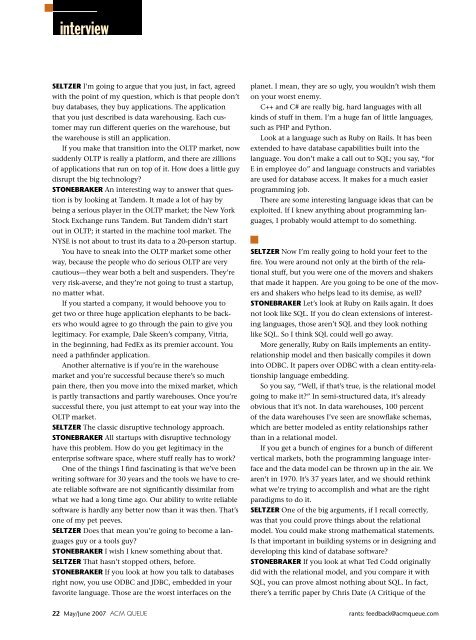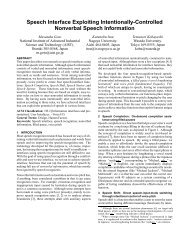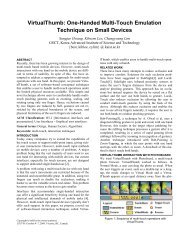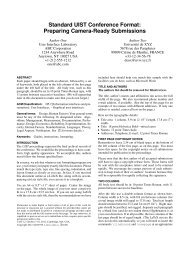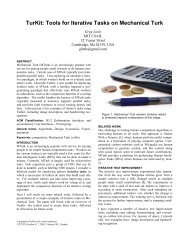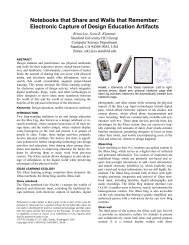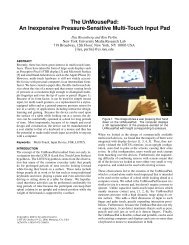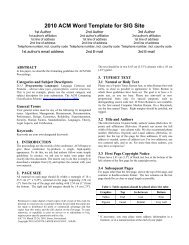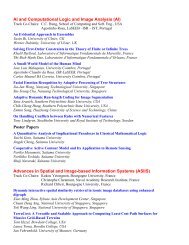API Design Matters Stonebraker and Seltzer - RabbitMQ
API Design Matters Stonebraker and Seltzer - RabbitMQ
API Design Matters Stonebraker and Seltzer - RabbitMQ
Create successful ePaper yourself
Turn your PDF publications into a flip-book with our unique Google optimized e-Paper software.
interview<br />
SELTZER I’m going to argue that you just, in fact, agreed<br />
with the point of my question, which is that people don’t<br />
buy databases, they buy applications. The application<br />
that you just described is data warehousing. Each cus-<br />
tomer may run different queries on the warehouse, but<br />
the warehouse is still an application.<br />
If you make that transition into the OLTP market, now<br />
suddenly OLTP is really a platform, <strong>and</strong> there are zillions<br />
of applications that run on top of it. How does a little guy<br />
disrupt the big technology?<br />
STONEBRAKER An interesting way to answer that ques-<br />
tion is by looking at T<strong>and</strong>em. It made a lot of hay by<br />
being a serious player in the OLTP market; the New York<br />
Stock Exchange runs T<strong>and</strong>em. But T<strong>and</strong>em didn’t start<br />
out in OLTP; it started in the machine tool market. The<br />
NYSE is not about to trust its data to a 20-person startup.<br />
You have to sneak into the OLTP market some other<br />
way, because the people who do serious OLTP are very<br />
cautious—they wear both a belt <strong>and</strong> suspenders. They’re<br />
very risk-averse, <strong>and</strong> they’re not going to trust a startup,<br />
no matter what.<br />
If you started a company, it would behoove you to<br />
get two or three huge application elephants to be back-<br />
ers who would agree to go through the pain to give you<br />
legitimacy. For example, Dale Skeen’s company, Vitria,<br />
in the beginning, had FedEx as its premier account. You<br />
need a pathfinder application.<br />
Another alternative is if you’re in the warehouse<br />
market <strong>and</strong> you’re successful because there’s so much<br />
pain there, then you move into the mixed market, which<br />
is partly transactions <strong>and</strong> partly warehouses. Once you’re<br />
successful there, you just attempt to eat your way into the<br />
OLTP market.<br />
SELTZER The classic disruptive technology approach.<br />
STONEBRAKER All startups with disruptive technology<br />
have this problem. How do you get legitimacy in the<br />
enterprise software space, where stuff really has to work?<br />
One of the things I find fascinating is that we’ve been<br />
writing software for 30 years <strong>and</strong> the tools we have to cre-<br />
ate reliable software are not significantly dissimilar from<br />
what we had a long time ago. Our ability to write reliable<br />
software is hardly any better now than it was then. That’s<br />
one of my pet peeves.<br />
SELTZER Does that mean you’re going to become a lan-<br />
guages guy or a tools guy?<br />
STONEBRAKER I wish I knew something about that.<br />
SELTZER That hasn’t stopped others, before.<br />
STONEBRAKER If you look at how you talk to databases<br />
right now, you use ODBC <strong>and</strong> JDBC, embedded in your<br />
favorite language. Those are the worst interfaces on the<br />
planet. I mean, they are so ugly, you wouldn’t wish them<br />
on your worst enemy.<br />
C++ <strong>and</strong> C# are really big, hard languages with all<br />
kinds of stuff in them. I’m a huge fan of little languages,<br />
such as PHP <strong>and</strong> Python.<br />
Look at a language such as Ruby on Rails. It has been<br />
extended to have database capabilities built into the<br />
language. You don’t make a call out to SQL; you say, “for<br />
E in employee do” <strong>and</strong> language constructs <strong>and</strong> variables<br />
are used for database access. It makes for a much easier<br />
programming job.<br />
There are some interesting language ideas that can be<br />
exploited. If I knew anything about programming lan-<br />
guages, I probably would attempt to do something.<br />
SELTZER Now I’m really going to hold your feet to the<br />
fire. You were around not only at the birth of the rela-<br />
tional stuff, but you were one of the movers <strong>and</strong> shakers<br />
that made it happen. Are you going to be one of the mov-<br />
ers <strong>and</strong> shakers who helps lead to its demise, as well?<br />
STONEBRAKER Let’s look at Ruby on Rails again. It does<br />
not look like SQL. If you do clean extensions of interest-<br />
ing languages, those aren’t SQL <strong>and</strong> they look nothing<br />
like SQL. So I think SQL could well go away.<br />
More generally, Ruby on Rails implements an entity-<br />
relationship model <strong>and</strong> then basically compiles it down<br />
into ODBC. It papers over ODBC with a clean entity-rela-<br />
tionship language embedding.<br />
So you say, “Well, if that’s true, is the relational model<br />
going to make it?” In semi-structured data, it’s already<br />
obvious that it’s not. In data warehouses, 100 percent<br />
of the data warehouses I’ve seen are snowflake schemas,<br />
which are better modeled as entity relationships rather<br />
than in a relational model.<br />
If you get a bunch of engines for a bunch of different<br />
vertical markets, both the programming language inter-<br />
face <strong>and</strong> the data model can be thrown up in the air. We<br />
aren’t in 1970. It’s 37 years later, <strong>and</strong> we should rethink<br />
what we’re trying to accomplish <strong>and</strong> what are the right<br />
paradigms to do it.<br />
SELTZER One of the big arguments, if I recall correctly,<br />
was that you could prove things about the relational<br />
model. You could make strong mathematical statements.<br />
Is that important in building systems or in designing <strong>and</strong><br />
developing this kind of database software?<br />
STONEBRAKER If you look at what Ted Codd originally<br />
did with the relational model, <strong>and</strong> you compare it with<br />
SQL, you can prove almost nothing about SQL. In fact,<br />
there’s a terrific paper by Chris Date (A Critique of the<br />
22 May/June 2007 ACM QUEUE rants: feedback@acmqueue.com


